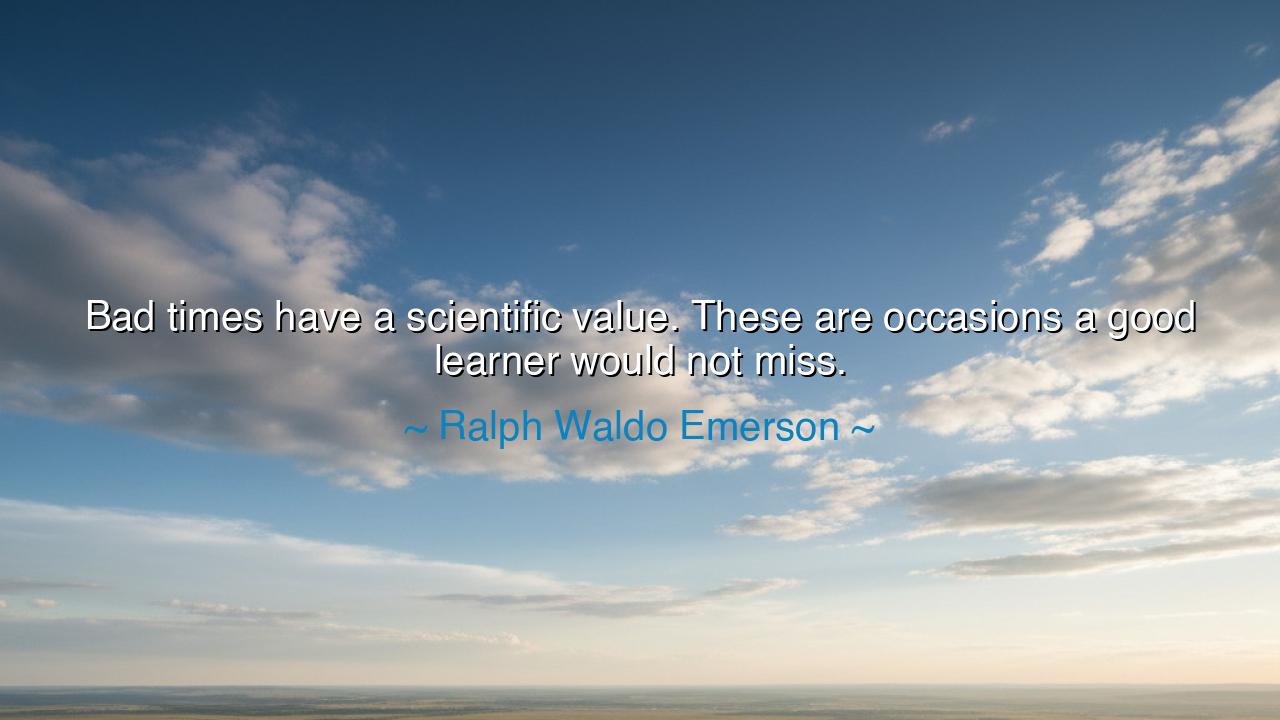
Bad times have a scientific value. These are occasions a good






"Bad times have a scientific value. These are occasions a good learner would not miss." These words from Ralph Waldo Emerson echo with deep wisdom and a truth that has resonated through the ages. In every age, adversity and struggle have been seen not only as trials to endure but as opportunities to learn, to grow, and to discover truths that are hidden in the shadows of hardship. In the ancient world, when great philosophers like Socrates and Plato spoke of the human condition, they understood that it is often in difficult moments that we find the deepest lessons. To face hardship is not merely to suffer; it is to open ourselves to the possibility of transformation and understanding. For a good learner, these moments are not to be feared, but welcomed as moments of great potential.
The value of bad times lies not in their inherent pain, but in the wisdom they impart. Socrates, when faced with the charges of corrupting the youth of Athens, did not shrink from his fate. Instead, he saw it as an opportunity to question the very nature of justice and truth. In his trial, he famously declared that "the unexamined life is not worth living." He understood that adversity was the spark that ignites the search for deeper knowledge. Just as a sword is sharpened by the fire, so too is the soul honed by the trials and struggles that life presents. The bad times, therefore, are not burdens to bear in silence, but lessons to be studied with great care.
Think of the great explorers and thinkers throughout history, who encountered adversity on their paths and turned it into scientific discovery. Galileo Galilei, for example, faced not only opposition from the Church but also loneliness in his pursuit of truth. The scientific truths he uncovered about the heliocentric universe were met with scorn and rejection. Yet, in those dark times, Galileo remained steadfast, for he recognized the value of the struggle. It was not the praise of his contemporaries that drove him, but the deep satisfaction of seeking the truth and understanding the world on a deeper level. Bad times, for him, were not merely obstacles; they were the crucible in which his greatest insights were forged.
Similarly, consider the life of Marie Curie, whose groundbreaking work in radioactivity was fraught with challenges and personal sacrifices. She faced opposition from male-dominated scientific circles, as well as the health risks of working with radioactive materials. Her struggles, however, did not deter her but propelled her forward into even greater discoveries. In the face of adversity, she did not retreat into despair but leaned into the difficulties, knowing that the scientific value of her work lay in the ability to persevere and push the boundaries of human knowledge. Bad times were the conditions in which her brilliance shone brightest, illuminating a path for future generations.
The lesson from Emerson’s words is profound and powerful: adversity is not simply something to endure, but an opportunity to grow, to learn, and to transform. It is during the hardships of life that we are most likely to encounter the truths we have not yet understood, the lessons that will shape us into stronger, wiser individuals. A good learner does not fear bad times; they see them as a chance to develop resilience, to deepen understanding, and to forge ahead into realms of knowledge that would remain closed were it not for the trials they faced. The scientific value of adversity lies in its ability to challenge our assumptions and force us to look deeper into the nature of the world and ourselves.
In our own lives, we are all bound to encounter bad times—moments of pain, loss, and struggle. Emerson’s wisdom encourages us to embrace these moments, not as mere misfortune, but as fertile ground for growth and learning. When we face hardship, we must ask ourselves, "What can I learn from this?" Instead of succumbing to despair, let us meet adversity with open minds and hearts, ready to explore the lessons it offers. Just as the great minds of history saw scientific value in their challenges, so too can we see value in the trials we face. Each difficulty is an invitation to grow, to refine our understanding, and to emerge stronger than before.
So, take this lesson with you: in every struggle, there is a hidden lesson waiting to be uncovered. When bad times come, do not shy away from them, but lean into them. Study them as you would a great discovery, and let them teach you. Seek the wisdom that lies beneath the surface of your suffering, and remember that through the forge of adversity, the brightest truths can be shaped. In this way, every challenge becomes not just a burden, but a stepping stone on your journey to knowledge, growth, and wisdom.






AAdministratorAdministrator
Welcome, honored guests. Please leave a comment, we will respond soon